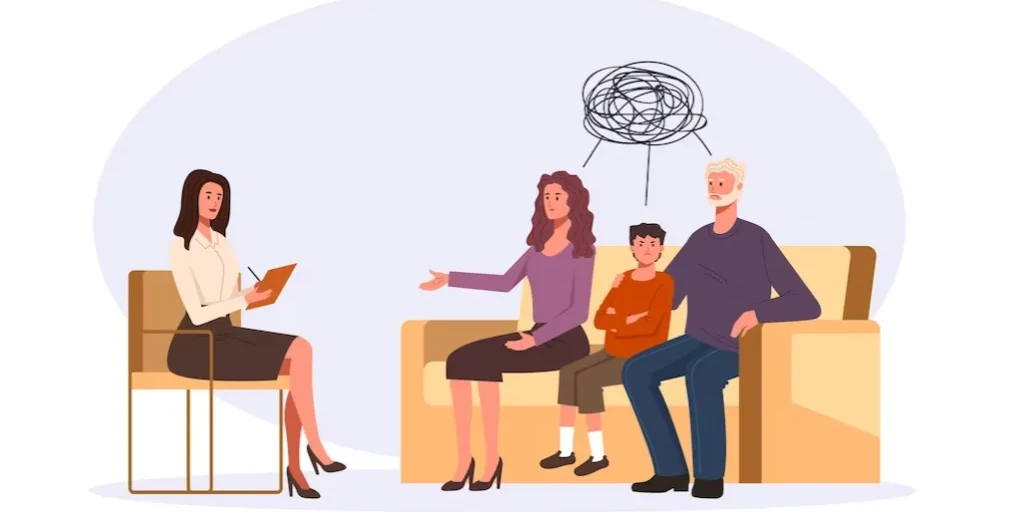24/7 Helpline:
(866) 899-221924/7 Helpline:
(866) 899-2219
Learn more about Drug Detox centers in Charlestown
Drug Detox in Other Cities

Other Insurance Options

Meritain

Lucent

Premera

Highmark

BHS | Behavioral Health Systems
Beacon

Sliding scale payment assistance

United Health Care

Absolute Total Care

Ambetter

Ceridian

Magellan

Oxford

MVP Healthcare

Private insurance

Multiplan

PHCS Network

GEHA

Evernorth

Self-pay options

Southern Indiana Treatment Center
Southern Indiana Treatment Center is a private rehab located in Charlestown, Indiana. Southern India...

South Shore Mental Health Center
South Shore Mental Health Center, in Charlestown, Rhode Island, is a mental health and dual diagnosi...








Wooded Glen Recovery Center
Wooded Glen Recovery Center, located in Henryville, Indiana, is a luxury drug and alcohol rehab for ...

Pocono Mountain Recovery Center
The Pocono Mountain Recovery Center provides a full range of addiction treatment programs to those s...

Innovative Counseling and Consulting
Innovative Counseling and Consulting is a drug and alcohol rehab and behavioral health center locate...

Harbor House
Harbor House - Alcohol and Drug Center offers inpatient treatment for men with substance abuse disor...

Synergy Treatment
Synergy Treatment is a drug and alcohol rehab located in Memphis, Tennessee. They provide residentia...

Baptist Rehabilitation – Outpatient
Baptist Rehabilitation – Outpatient is a private rehab located in Memphis, Tennessee. Baptist Rehabi...

Transformation Center and Associates
Transformation Center and Associates is a private rehab located in Memphis, Tennessee. Transformatio...

Memphis Center for Addiction Treatment
Memphis Center for Addiction Treatment is a private rehab located in Memphis, Tennessee. Memphis Cen...

Lighthouse Ministries
Lighthouse Ministries is a drug and alcohol rehab located in Memphis, TN. They provide outpatient ad...

Warriors Center
Warriors Center is a faith based drug and alcohol treatment center for men and women in Memphis, TN....

Serenity Recovery Centers
Serenity Recovery Centers is a drug and alcohol rehab located in Memphis, Tennessee. They provide re...

Compass Intervention Center
Compass Intervention Center is a drug and alcohol rehab center located in Memphis, TN. They provide ...

Behavioral Health Group (BHG) – Memphis
Behavioral Health Group (BHG) – Memphis is a private rehab located in Memphis, Tennessee. Behavioral...

Foundations Memphis
Foundations Memphis is a group-oriented outpatient program that provides day and evening program and...

Grace House – Primary House
Grace House - Primary House is located in Memphis, Tennessee. Grace House - Primary House is a treat...

Pyramid Recovery Center
Pyramid Recovery Center is a private rehab located in Memphis, Tennessee. Pyramid Recovery Center sp...

Mental Health Resources
Mental Health Resources is a private rehab located in Memphis, Tennessee. Mental Health Resources sp...

Memphis Recovery Centers
Memphis Recovery Centers is a drug and alcohol rehab located in Memphis, Tennessee. They provide out...

Crestwyn Behavioral Health Hospital
Crestwyn Behavioral Health Hospital, in Memphis, Tennessee, is a 12 step focused drug and alcohol re...

PAX Memphis
PAX Memphis is a drug and alcohol rehab located in Memphis, Tennessee. They provide intensive outpat...

First Step Recovery Centers
First Step Recovery Centers is a drug and alcohol rehab located in Memphis, Tennessee. They provide ...

MidSouth Sober Living
MidSouth Sober Living is a non-profit rehab located in Memphis, TN. MidSouth Sober Living specialize...

The Salvation Army – Purdue Center of Hope
The Salvation Army - Purdue Center of Hope is located in Memphis, Tennessee. The Salvation Army - Pu...

The HART Center
The HART Center is a private rehab located in Memphis, Tennessee. The HART Center specializes in the...

The Salvation Army – Adult Rehabilitation Center – ARC
The Salvation Army- Adult Rehab, located in Memphis, Tennessee, is a faith based residential work th...

Spero Health – Memphis
Spero Health – Memphis is a drug and alcohol rehab located in Memphis, Tennessee. They provide addic...

Memphis Alcohol and Drug Help
Memphis Alcohol and Drug Help is a private rehab located in Memphis, Tennessee. Memphis Alcohol and ...

Grace House – Residence for Recovering Women
Grace House - Residence for Recovering Women is located in Memphis, Tennessee. Grace House - Residen...

Saint Francis Hospital – Behavioral Health Services
Saint Francis Hospital Behavioral Health offers psychiatric treatment to adults and seniors in the M...






























































Lakeside Behavioral Health System – Dual Diagnosis
Lakeside Behavioral Health System – Dual Diagnosis is a rehab center that has decades of experience ...

Bartlett Therapy Center
Bartlett Therapy Center is a private rehab located in Memphis, Tennessee. Bartlett Therapy Center sp...

Youth Dimensions
Youth Dimensions is a private rehab located in Memphis, Tennessee. Youth Dimensions specializes in t...

Shelby County Schools – Mental Health Center
Shelby County Schools – Mental Health Center is a public rehab located in Memphis, Tennessee. Shelby...

East Memphis Therapy Center
East Memphis Therapy Center is a private rehab located in Memphis, Tennessee. East Memphis Therapy C...

Colonial Health Rehabilitation Center
Colonial Health Rehabilitation Center is a private rehab located in Memphis, Tennessee. Colonial Hea...

AA – Alcoholics Anonymous – Getwell Road
AA – Alcoholics Anonymous – Getwell Road is a non-profit rehab located in Memphis, Tennessee. AA – A...

Al – Anon and Al – Ateen
Al-Anon and Al-Ateen - Union Avenue offers outpatient services for families and loved ones of alcoho...

AA – Alcoholics Anonymous – Union Avenue
AA – Alcoholics Anonymous – Union Avenue is a non-profit rehab located in Memphis, Tennessee. AA – A...

Humanity United with God for Society
Humanity United with God for Society is a private rehab located in Memphis, Tennessee. Humanity Unit...

Life Enhancement Services
Life Enhancement Services is a private rehab located in Memphis, Tennessee. Life Enhancement Service...

Health Connect America
Health Connect America is a private rehab located in Memphis, Tennessee. Health Connect America spec...

ADC Recovery and Counseling Center
ADC Recovery and Counseling Center is a private rehab located in Memphis, Tennessee. ADC Recovery an...

Baptist Industrial Rehabilitation
Baptist Industrial Rehabilitation is a private rehab located in Memphis, Tennessee. Baptist Industri...

AA – Alcoholics Anonymous – Memphis
AA – Alcoholics Anonymous – Memphis is a non-profit rehab located in Memphis, Tennessee. AA – Alcoho...

AA – Alcoholics Anonymous – Helpline
AA – Alcoholics Anonymous – Helpline is a non-profit rehab located in Memphis, Tennessee. AA – Alcoh...

New Directions
New Directions is a drug and alcohol rehab located in Memphis, Tennessee. They provide both inpatien...

Lifetime Therapy Associates
Lifetime Therapy Associates is a private rehab located in Memphis, Tennessee. Lifetime Therapy Assoc...

Baby Love – Midtown Mental Health Center
Baby Love – Midtown Mental Health Center is a private rehab located in Memphis, Tennessee. Baby Love...

Detox West Tennessee
Detox West Tennessee is a private detox clinic located in Memphis, Tennessee. Detox West Tennessee s...

Mid South Alcohol and Drug Education Center
Mid South Alcohol and Drug Education Center is a private rehab located in Memphis, Tennessee. Mid So...

Memphis Rehabilitation Center
Memphis Rehabilitation Center is a private rehab located in Memphis, Tennessee. Memphis Rehabilitati...

Life Strategies Counseling
Life Strategies Counseling is a private rehab located in Memphis, Tennessee. Life Strategies Counsel...

CAAP – Cocaine and Alcohol Awareness Program
CAAP provides high quality behavioral health and co-occurring mental health services for those who a...

Whitehaven Mental Health Center – Drug and Alcohol Abuse
Whitehaven Mental Health Center – Drug and Alcohol Abuse is a private rehab located in Memphis, Tenn...

Urban Family Ministries
Urban Family Ministries is a private rehab located in Memphis, Tennessee. Urban Family Ministries sp...

Alcohol and Chemical Abuse Rehabilitation Center
Alcohol and Chemical Abuse Rehabilitation Center is a private rehab located in Memphis, Tennessee. A...

Grace House – Halfway House
Grace House - Halfway House is located in Memphis, Tennessee. Grace House - Halfway House is a treat...














































































































































